Mark Zuckerberg is the world-famous co-founder of Meta Platforms, the parent company of Facebook and Instagram, two of the world’s largest social media networks. He started the business when he was only 19 years old, building an app for Harvard students to connect names with faces and create online profiles. Fast forward to 2025, and Mark Zuckerberg’s net worth is estimated at over $190 billion.
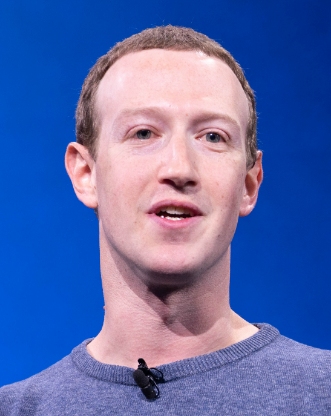
Zuckerberg took Facebook public in 2012 with the biggest-ever technology initial public offering (IPO). Today, he remains the chairman, chief executive officer, and controlling shareholder of Meta Platforms.
In this article, we will tell you all about Mark Zuckerberg’s success with Meta Platforms, his career before founding the business, as well as his crypto stance and investments.
Breaking Down Mark Zuckerberg’s Net Worth
Meta stock has been on a record winning streak in recent years, exceeding a market cap of $1.3 trillion. This puts Mark Zuckerberg third on Bloomberg’s rich list, behind only Amazon Founder Jeff Bezos and Tesla CEO Elon Musk.
Zuckerberg’s stake in Meta Platforms is reportedly 13%, which, based on the valuation of $1.38 trillion, is worth about $180 billion. His Meta shares make up the vast majority of his fortune. As Facebook’s CEO, Mark Zuckerberg earns a symbolic salary of $1 per year, but he also benefits from stock-based compensation and perks like private security, which costs Meta tens of millions of dollars annually.
Below, you will find a detailed net worth breakdown of his major assets, stake, and income sources.
| Asset or Income Source | Contribution to Net Worth |
| Meta stock | 13% worth $188+ billion |
| Salary and compensation | $1 a year + stock-based compensation and other perks |
| Real estate | multiple properties worth $300+ million |
| Other investments/ sources of income | undisclosed |
| Total Net Worth | $190+ billion |
Mark Zuckerberg Net Worth: Early Life and Education
Mark Elliot Zuckerberg was born on May 14, 1984, in White Plains, New York. He wasn’t your average kid glued to the computer. Instead, he was the one who built the games that others played. Raised in Dobbs Ferry, New York, his fascination with computers and technology in general started when he was young.
His father, a dentist, and his mother, a psychiatrist, supported Mark’s early curiosity. By the time he was 11 or 12 years old, he had already built “ZuckNet,” a simple messaging system that connected the computers in his house to the one in his dad’s dental office.
Zuckerberg didn’t stop at messaging apps, either. In high school, he worked on a project called the Synapse Media Player, a machine learning-based music player that learned your music taste to create smart playlists. The software caught some buzz online and was even featured on Slashdot, and PC Magazine gave it a 3 out of 5 rating.
At the time, companies like Microsoft and AOL even reportedly showed an interest in acquiring Synapse. However, Mark wasn’t ready to sell out just yet.
While his peers were working through standard classes in high school, Zuckerberg was moonlighting as a college student. He took graduate-level computer courses at Mercy College, which allowed him to sharpen his programming skills while he was still a teenager.
When he enrolled at Harvard University in 2002, the tech world didn’t know Mark Zuckerberg’s name just yet, but other Harvard students were already calling him a coding whiz. At Harvard, he majored in psychology and computer science. He lived in Kirkland House, joined the Jewish fraternity Alpha Epsilon Pi, and kept on hacking.
One of Zuckerberg’s first big hits at Harvard was CourseMatch, a tool that helped students figure out what classes they should take based on what their friends were choosing. Next came the infamous Facemash, a highly controversial site that allowed users to vote on who was more attractive between randomly paired photos from dorm directories.
Facemash exploded in popularity, so much so that it briefly shut down Harvard’s entire network. Needless to say, the school’s officials weren’t thrilled, and many students were upset their pictures were used without permission. Zuckerberg had to take the site offline and issue a public apology.
This misstep caused quite a stir, but it also sparked a great idea in Mark Zuckerberg’s mind – to create the social media platform that would become Facebook.
Even though Zuckerberg dropped out of Harvard in 2004, he eventually completed his education, earning a degree in May 2017.
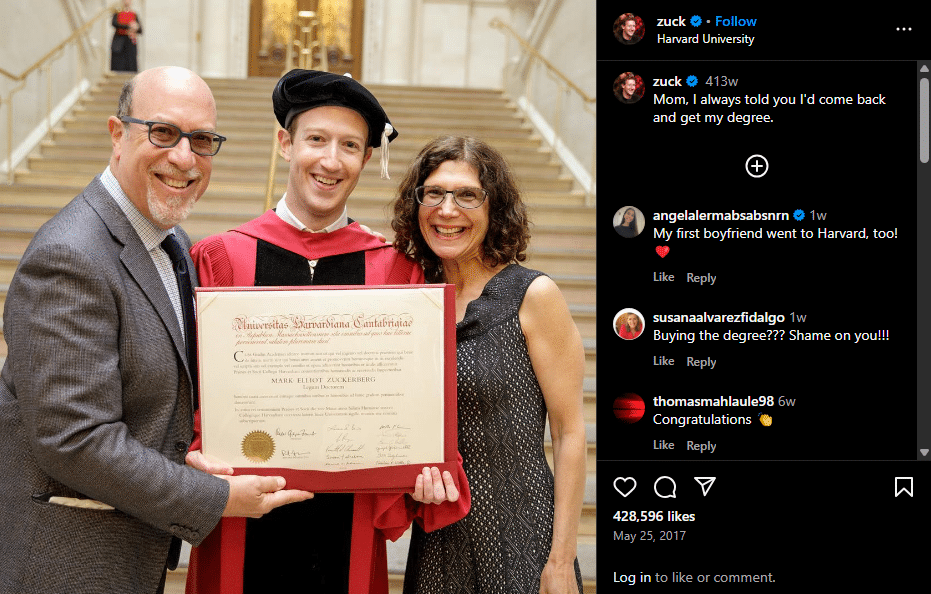
Personal Life
Mark Zuckerberg met fellow Harvard student Priscilla Chan at a frat party during his sophomore year. They began dating in 2003. In September 2010, Chan, who was a medical student at the University of California, moved into Zuckerberg’s rented house in Palo Alto. They married in May 2012 on the grounds of his mansion, in an event that also celebrated her graduation from medical school.
In July 2015, Zuckerberg revealed that they were expecting a baby girl, sharing that Chan had experienced three miscarriages at that point. Their first daughter was born in December of the same year, and the couple announced in a Chinese New Year video that they named her Chen Mingyu.
In 2017, the Zuckerbergs had their second daughter, and in 2023, they welcomed their third daughter.
In interviews, Mark Zuckerberg often mentions how his relationship with his wife has grounded him. He has often credited her with keeping him balanced despite the many pressures of leading a global tech company.
Together, the couple co-founded the Chan Zuckerberg Initiative (CZI) in 2015. Through it, they pledged to give away the majority of their Meta stake, 99% to be exact, over their lifetimes.
Zuckerberg and his family own several multi-million-dollar homes, including their Palo Alto estate, valued at over $50 million, their Hawaii compound, worth $170 million, and their Lake Tahoe mansions, worth around $60 million.
The Birth of Facebook and Zuckerberg’s Growing Success
Mark Zuckerberg’s journey to becoming one of the wealthiest people worldwide began while he was still at Harvard. He dropped out of Harvard without obtaining his degree to pursue what would turn out to be a highly successful tech career. Let’s see how he created Facebook and turned it into the biggest social media platform in the world.
The Founding and Growth of Facebook
Mark Zuckerberg launched “Thefacebook” on February 4, 2004, from his Harvard dorm room, collaborating with roommates Eduardo Saverin, Andrew McCollum, Dustin Moskovitz, and Chris Hughes. The site was inspired by the printed student directories (face books) from his prep school, Phillips Exeter Academy.
That same year, Zuckerberg dropped out of Harvard and moved the team to Palo Alto, where they met Peter Thiel, who invested $500,000 for 10% of Facebook.
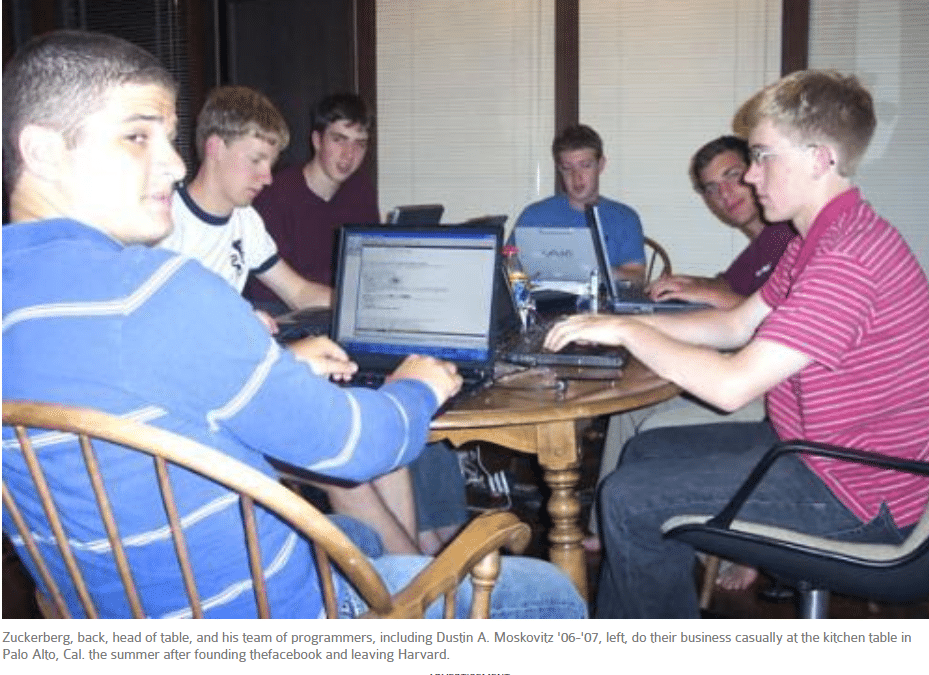
The social network was initially exclusive to Harvard students, but it rapidly expanded to other Ivy League institutions and other U.S. and Canadian universities. By 2006, Facebook was available to anyone aged 13 and older with a valid email address. Two years later, it had surpassed Myspace to become the #1 social network in the world.
In 2005, the company dropped “the” from its name after purchasing the domain facebook.com for $200,000. That same year, the Napster co-founder Sean Parker became Facebook’s first president.
Facebook’s user base grew exponentially and reached 500 million monthly active users by July 2010. This growth led to the landmark IPO in May 2012, where Facebook raised $16 million and achieved a peak market capitalization of over $104 billion.
At this point, Mark Zuckerberg had become one of the youngest self-made billionaires in history.
To diversify its offerings and buy out the competition, Facebook acquired rival social media giant Instagram in 2012 (for $1 billion) and the messaging app WhatsApp in 2014 (for $19 billion). Based on internal communication leaked from 2018-2022, Zuckerberg was concerned about Instagram’s rising dominance potentially overshadowing Facebook, even after it was acquired. This is why he made branding decisions like adding “Instagram from Facebook” and rebranding the parent company to Meta Platforms in 2021.
On October 28, 2021, Zuckerberg announced the rebranding of Facebook’s parent company to Meta Platforms, which signaled a shift toward building the metaverse.
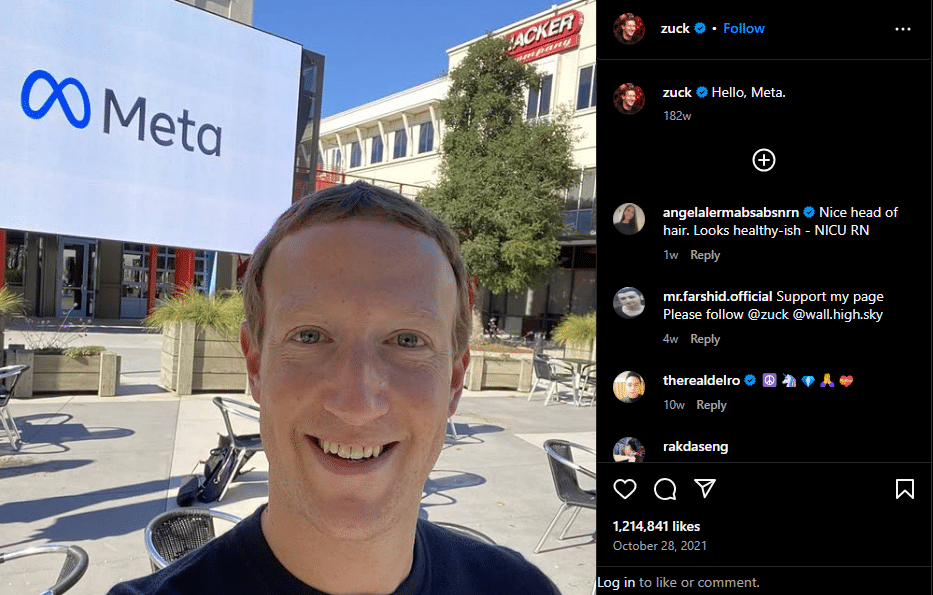
Still, the transition has been rocky. Meta Platforms lost over $40 billion in metaverse investments via its Reality Lab division. In 2022 and 2023, the company laid off tens of thousands of employees. However, Facebook still boasts over 3 billion monthly active users and remains the world’s most widely used social network.
Legal Troubles and Controversies
Just six days after the launch of the social network, Harvard students Cameron and Tyler Winklevoss, along with Divya Narendra, accused Mark Zuckerberg of stealing their idea. They had been working on HarvardConnection (later ConnectU) and claimed that Zuckerberg strung them along while building a competing platform.
After years of legal proceedings, they reached a settlement in 2008, in which the Winklevoss brothers were paid $20 million in cash and received 1.2 million Facebook shares.
Even though Eduardo Saverin was a co-founder and initially Facebook’s CEO, he was later edged out of the business. Zuckerberg diluted his shares, claiming Saverin had stopped contributing to the social network. Another legal battle followed, with the settlement details being undisclosed. Unofficially, Saverin retained a stake worth billions. According to Forbes, he had over $2 billion in Facebook shares in 2012.
In 2018, the data of 87 million Facebook users was harvested without their consent and used for political profiling (the Cambridge Analytica scandal). This clearly violated user privacy rights and even breached Facebook’s own data policies. The scandal was put in the spotlight by numerous media outlets, including NBC, CBS News, etc.
As a result, Facebook was fined $5 billion by the FTC, and Zuckerberg had to testify before Congress. He was pressed on how Facebook makes money despite being free to users, hinting at privacy concerns inherent in an ad-based model like Facebook’s. Zuckerberg famously sipped water awkwardly and replied, “Senator, we run ads.”
Between 2016 and 2021, Facebook became a central figure in growing global concerns about how social media platforms can be used to undermine democracy and the well-being of the public. During the 2016 U.S. presidential election, Russia-linked organizations used Facebook to spread disinformation and polarize voters, as well as to create content through fake accounts and paid ads. The platform responded rather slowly, and the full extent of this only became clear after intense scrutiny from U.S. intelligence agencies and journalists.
In 2021, former Facebook employee Frances Haugen leaked thousands of internal documents, later dubbed the Facebook Papers. In the documents, he exposed how the company routinely prioritized user engagement and growth over user privacy and safety. Her revelations were published by The Wall Street Journal and included evidence that Facebook was fully aware of the harmful effects of Instagram on teen mental health but did little to intervene.
In recent years, Meta has introduced new privacy policies and features, including the use of optional cookies and essential cookies on its platforms. Essential cookies are necessary for the basic functioning of the company’s websites and apps, while optional cookies are used to collect data on user behavior to improve meta products, personalized ads, and other services.
However, these cookie policies have also sparked criticism, especially in Europe, where stricter privacy regulations like the GDPR require clearer consent from users.
Mark Zuckerberg’s Other Projects and Investments
Mark Zuckerberg has been involved in several significant projects beyond Facebook and Meta Platforms.
Wirehog
Shortly after he launched Facebook in 2004, Zuckerberg faced competition from other emerging platforms using similar technologies. One such platform was i2hub, a peer-to-peer file-sharing service founded by Wayne Chang.
While i2hub was growing in popularity among university students, Zuckerberg and his team saw an opportunity to enter the file-sharing space. In August 2004, Zuckerberg, along with Andrew McCollum, Adam D’Angelo, and Sean Parker, launched Wirehog, a competing service.
This service later influenced the development of multiple Facebook Platform applications, which were introduced in 2007. And while Wirehog didn’t achieve the same success as Facebook, it helped shape the development of Facebook’s future applications and features.
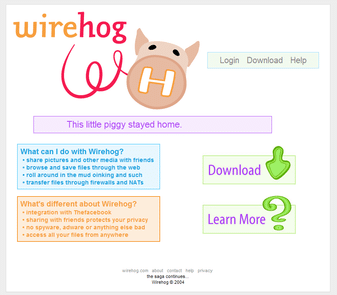
Internet.org
In 2013, Zuckerberg launched Internet.org, a bold initiative aimed at bringing the internet to the billions of people without access in underserved regions. The goal of Internet.org was to connect the five billion people who lacked internet access at the time by offering free, limited internet services, mostly through mobile phones.
However, this project of his faced quite the opposition in India, where people argued that it violated the principle of net neutrality. Zuckerberg defended the initiative, stating that offering a limited form of internet was still better than no internet access at all.
In February 2016, after regulatory troubles, the project was shut down in India. Despite this, Zuckerberg met with Indian Prime Minister Narendra Modi to explore alternative ways to connect the population of the country.
Breakthrough Starshot
Zuckerberg’s interest extends beyond social media and into space exploration. In 2016, he co-founded Breakthrough Starshot, a project that aims to develop spacecraft capable of traveling to Alpha Centauri, the closest star system to Earth. Even though it is the closest star system, it’s still over 4.3 light-years away, so traveling there would be an extraordinarily difficult task.
Zuckerberg collaborated with the Russian billionaire investor Yuri Milner, and the renowned physicist Stephen Hawking, to create this initiative. Today, Breakthrough Starshot remains in the research and development phase.
Media Portrayals of Mark Zuckerberg
Mark Zuckerberg was portrayed by Jesse Eisenberg in The Social Network, a film from 2010 about the founding of Facebook. Although Zuckerberg wasn’t thrilled by the film, he acknowledged its impact.
In addition to this film, Zuckerberg made appearances on shows like The Simpsons and Saturday Night Live, where his character was humorously depicted.
Mark Zuckerberg’s Stance on Crypto and Investments
Zuckerberg proved his affinity for cryptocurrency when he named his pet goat “Bitcoin.” In recent months, shareholders have advocated for Meta to diversify its treasury by incorporating Bitcoin. However, Zuckerberg hasn’t yet publicly endorsed such initiatives.
As for his personal crypto holdings, he hasn’t disclosed any details about his investments. However, Meta has explored digital tokens like “Zuck Bucks” for Facebook and Instagram users, as part of a strategy to reduce the company’s reliance on advertising revenue. The effort includes integrating creator coins and NFTs, though Zuckerberg’s previous attempt at launching a global cryptocurrency, Diem, was abandoned due to regulatory issues.
What Can We Learn from Mark Zuckerberg’s Story?
Mark Zuckerberg’s journey from his Harvard dorm room to leading one of the most influential companies worldwide offers various lessons in entrepreneurship and innovation. Zuckerberg saw the potential of social media early on and capitalized on it when most people thought it was just a passing trend.
Worried that Facebook’s core business model, based on ad revenue, was threatened by new data privacy rules and regulations, Zuckerberg decided to shift his focus to the metaverse, virtual reality, and digital currencies through the company’s investment. Most of these efforts were far from successful, but they may have helped his business remain relevant.
Meta has also been quick to ‘replicate’ many elements from other platforms, such as implementing short-form videos similar to those on TikTok into Instagram. Zuckerberg’s career highlights the importance of constant innovation.
Lastly, one critical lesson from his journey is the need for greater accountability and ethical responsibility, especially when leading massive platforms with global influence. Zuckerberg’s vision has propelled Meta to amazing heights, but his company has also been at the center of many controversies.
These events highlight the importance of prioritizing data security and user privacy, as well as the ethical implications of technology.
FAQs
What is Mark Zuckerberg's net worth in 2025?
As of 2025, Mark Zuckerberg's net worth is estimated at $190 billion. Much of his wealth is tied to his stake in Meta, so it fluctuates greatly.
How did Zuckerberg get started with Facebook?
Zuckerberg founded Facebook in 2004 from his Harvard dorm room. The platform was initially created for university students before it expanded globally.
What role does Mark Zuckerberg play in Meta?
Zuckerberg is the co-founder and CEO of Meta Platforms.
Why did Zuckerberg change Facebook's name to Meta?
In 2021, Zuckerberg rebranded Facebook to Meta to reflect the company's new focus on building the metaverse, a virtual world that integrates augmented reality, virtual reality, and blockchain technologies.